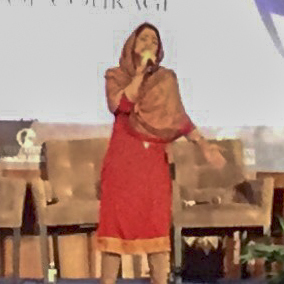A Quote by Arundhati Roy
There was a time when the women of Afghanistan - at least in Kabul - were out there. They were allowed to study, they were doctors and surgeons, walking free, wearing what they wanted. That was when it was under Soviet occupation. Then the United States starts funding the mujahideen. Reagan called them Afghanistan's "founding fathers." It reincarnates the idea of "jehad," virtually creates the Taliban.
Related Quotes
In 2001, we were told that the war in Afghanistan was a feminist mission. The marines were liberating Afghan women from the Taliban. Can you really bomb feminism into a country? And now, after 25 years of brutal war - 10 years against the Soviet occupation, 15 years of US occupation - the Taliban is riding back to Kabul and will soon be back to doing business with the United States.
In Iraq, until before the war, the women were scientists, museum directors, doctors. I'm not valourising Saddam Hussein or the Soviet occupation of Afghanistan, which was brutal and killed hundreds of thousands of people - it was the Soviet Union's Vietnam. I'm just saying that now, in these new wars, whole countries have slipped into mayhem - the women have just been pushed back into their burqas - and not by choice.
As a critic, I try to stay neutral about movies before I see them, but I really wanted "Whiskey Tango Foxtrot" to be great. It's based on a barbed memoir by Kim Barker called "The Taliban Shuffle: Strange Days In Afghanistan And Pakistan." And its stars Tina Fey, out of her comfort zone, just as Barker was a fish out of water when, in 2004, she began covering the Afghanistan occupation for the Chicago Tribune.
Not long ago, women in Afghanistan were required by Taliban leadership to be covered nearly head-to-toe and were barely allowed to leave the home; that young Afghan women today are not only accessing an education but are able to meet young people from around the world and cheer on a robot of their own making is something beautiful.
The future of Afghanistan is incredibly dark, and decisions are happening incredibly quickly. Speculation is a fool's game, but I've seen many political projections that look like the Taliban could hold most of the country, and possibly Kabul, within perhaps a short time. I can't imagine how Afghanistan's fall isn't going to be ten times faster than Iraq's. The role of women in that space is terrifying, and the idea of retribution is a nightmare.
What everyone underestimated was the acute unpopularity of the Taliban, even in the Pashtun areas. People like myself were saying the Taliban would be driven out very swiftly from the north of Afghanistan, but given that their main support base was in the Pashtun belt, there would be greater resistance there. That didn't happen. The Taliban had become deeply unpopular and were actually discarded by the Pashtun population almost as quickly as they were in the north. I don't see the Taliban coming back in any way.
When the Taliban captured Kabul in 1996 after a searing, four-year civil war, they immediately instituted laws which fit their utopic vision of the time of Islam's founding more than 1,300 years earlier. Afghan women's lives offered the most visible sign of the imagined past to which Afghanistan's present was to be returned.
In early 1999, I was watching TV, when I came across a story on Afghanistan. It was a story about the Taliban and the restrictions they were imposing on the Afghan people, most notably women. At some point in the story, there was a casual reference to them having banned the game of kite fighting. This detail struck a personal chord with me, as I had grown up in Kabul flying kite with my friends.
Since the 1950s (until the early 1990s), girls in Kabul and other cities attended schools. Half of university students were women, and women made up 40 percent of Afghanistan’s doctors, 70 percent of its teachers and 30 percent of its civil servants. A small number of women even held important political posts as members of Parliament and judges. Most women did not wear the burqa.
People don't even recognize who the Founding Fathers of the United States were. They were exceptional human beings - when you signed the Declaration of Independence, that was a death warrant they signed their name to. You have to have courage to put your name on a death warrant against the most powerful nation in the world at that time. And yet, we didn't honor who they really were. They were deists. They lived an enlightened belief system.




































